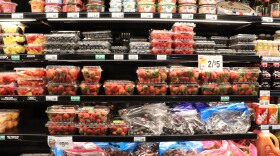-
Federal data found that millions of people struggled to get enough food in 2024. The report will be the final publication of such data after the U.S. Department of Agriculture said it will scrap the annual hunger survey.
-
The number of women over 40 having babies is increasing nationwide, even as the overall birth rate declines. Plus, a nonprofit food distributor created its own free marketplace to tackle hunger across the country.
-
Federal food assistance has started to flow again after the government reopened. But the charitable food system is planning for continued need through the end of the year.
-
For some grocery stores in the urban core, up to 60% of their business comes from shoppers using federal food benefits. A SNAP shutdown just before Thanksgiving and Christmas could be particularly bad for businesses.
-
More than a million low-income mothers and children in the Midwest and Great Plains rely on a national food assistance program. The Trump administration says it will help provide temporary funding to keep the program afloat, but food advocates say it’s a short-term fix.
-
People working to address hunger say the canceled report is a main resource to understand where and how people are experiencing food insecurity across the country.
-
New federal legislation has changed who qualifies for food stamps and health care benefits like Medicaid. Under President Donald Trump's 'Big Beautiful Bill,' most refugees and people receiving asylum are no longer eligible.
-
State lawmakers must soon decide whether to cover the extra costs to provide food assistance. If they don’t, food banks and pantries alone can’t make up the difference.
-
Cuts to federal food aid have already reduced the food available at area food pantries and meal sites. If SNAP gets hit too, nonprofits worry they won’t be able to keep up with demand.
-
As Kansas Citians begin a holiday season of feasting, a rising number of people don’t know where or when their next meal will be. Plus: The Ogallala aquifer is a critical source of water in western Kansas, and it’s running dry.
-
Kansas City nonprofits need to feed more hungry people with less funding. Here's what they're tryingKansas City community kitchens are seeing higher demand as food prices remain high and COVID-19 assistance disappears. The food bank Harvesters is focusing on rescuing food waste as one way to shore up its supplies as demand rises, and donations are down.
-
The Missouri Department of Conservation is encouraging deer hunters to donate meat through its Share the Harvest program.
Play Live Radio
Next Up:
0:00
0:00
Available On Air Stations











